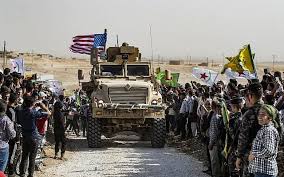Kurds slams as US troops withdrawal

Turkey has massed thousands of troops along the border with Syria.US troops have begun withdrawing from positions in northern Syria, paving the way for a Turkish operation against Kurdish fighters in the border area.
Kurdish-led forces have until now been a key US ally in Syria, where they helped defeat the Islamic State group, but Turkey regards them as terrorists.
The main Kurdish-led group called the surprise US move a “stab in the back”.
But President Donald Trump defended the pullout, saying it was time “to get out of these ridiculous Endless Wars”.
The withdrawal follows a White House statement issued late on Sunday, saying US troops were stepping aside for an imminent Turkish operation.
Turkish President Recep Tayyip Erdogan says its aim is to combat Kurdish fighters in the border area, and to set up a “safe zone” for Syrian refugees currently living in Turkey.
The UN humanitarian chief in Syria, Panos Moumtzis, says aid workers are “preparing for the worst” if fighting breaks out in north-eastern Syria.
“From experience, this could result in a displacement of people, we want to make sure that we are ready,” he told reporters.
What did the White House say?
“Turkey will soon be moving forward with its long-planned operation into northern Syria,” the statement said.
“The United States Armed Forces will not support or be involved in the operation, and United States forces, having defeated the Isis territorial ‘Caliphate’, will no longer be in the immediate area.”
The White House also said that Turkey would take over all responsibility for IS fighters captured by Kurdish forces over the past two years.
Kurds in north-eastern Syria have been protesting against Turkey’s plan to set up a “safe-zone” there
More than 12,000 men are in detention on suspicion of being IS members in Kurdish-controlled camps located south of Turkey’s planned “safe zone”. At least 4,000 of them are foreign nationals.
How do countries deal with IS returnees?
The rise and fall of the Islamic State group
US allies betrayed
This represents a significant shift in US policy – President Trump acting against the advice of many in the Pentagon and state department.
It risks a recasting of alliances in Syria. The Kurds may be forced to seek an accommodation with the Syrian government. The potential chaos could facilitate a resurgence of IS. Indeed, the US pullback of its forces from the border area may herald the full withdrawal of troops from Syria that Mr Trump has long wanted.
It marks a betrayal of Washington’s Kurdish allies, a betrayal that many other countries in the region will note with alarm.
Both the Saudis and the Israelis are coming to realise that Mr Trump’s robust rhetoric is rarely matched by actions.
Last month the Syria Study Group, a bipartisan body commissioned by Congress, stated in its final report that the US still has significant security interests in Syria and retains some policy levers with which to influence events there. But that is clearly not Present Trump’s view.





